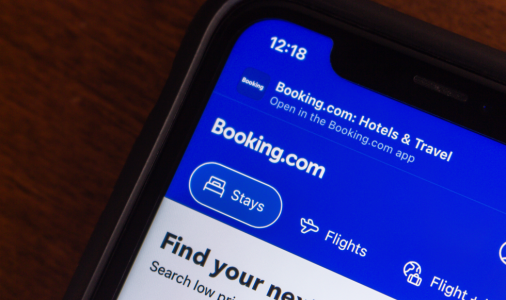Fake accommodation listings on sites are dupping travellers: 600% increase in just one year
By
- Replies 5
The convenience of booking accommodation online has revolutionised the way we travel.
We can secure a place to stay anywhere in the world with just a few clicks.
However, this ease also opens the door to new risks, as scammers prey on unsuspecting travellers with fake listings on popular platforms like Booking.com.
Imagine the excitement of arriving at your holiday destination, only to find that the accommodation you booked doesn't exist or isn't available.
This nightmare scenario became a reality for several travellers who thought they had secured a stay at a luxury property on the Sunshine Coast through Booking.com.
The property owners, Katie and Rob, were baffled as they had never listed their accommodation on the platform.
The guests, who had provided their banking details to secure the reservation, were left stranded and out of pocket.
‘We had a couple crying because they were so devastated,’ Katie said.
‘We couldn't do anything to help them other than be kind, try and explain it and get them to change their credit cards.’
Professor Cassandra Cross from Queensland University of Technology explained that scams targeting accommodation have been effective for criminals because online booking has become widespread.
‘We are all expected to be on these platforms booking and putting in our credit card and personal information,’ she stated.
The Australian Competition and Consumer Commission's (ACCC) Scamwatch program reported a staggering 600 per cent increase in scams mentioning Booking.com in just one year, with losses exceeding $337,000.
Dr Cross observed that as technology for detecting suspicious phone calls improves, scammers shift their tactics.
In 2023, reports of scam phone calls to ACCC's Scamwatch decreased from 63,816 to 55,418.
To lure in travellers, they copy legitimate listings from other sites, complete with photos and descriptions.
The challenge for global platforms like Booking.com and Airbnb is the sheer volume of listings they must monitor.
‘There is nothing to stop an offender from creating listings or copying listings onto other sites, which makes this a difficult and challenging scam sometimes to identify,’ Dr Cross added.
‘The ability for offenders to replicate and create these fraudulent posts far outweighs the ability of platforms to remove them.’
This leaves travellers vulnerable, and platforms scramble to keep up.
Katie and Rob struggled to report the fake listings since they needed an active account with the platform.
Despite multiple attempts to contact Booking.com's customer service, the false listings remained online for about a week before being removed.
The couple now checks daily to ensure no new fake listings appear.
‘Every way we turned, we had no power,’ Rob said.
‘We were racking our brains on how to do the damage control because we didn't know how many more people were coming.’
CHOICE policy adviser Alex Söderlund and others are calling for digital platforms to take more action to protect users from scams.
‘Digital platforms must do more to protect users from scams, instead of allowing scammers to use their platforms to steal money from consumers,’
‘These big tech companies have the means and expertise to protect people from scams, but they won't do more without the government making them.’ he said.
An Australian traveller who chose to remain anonymous encountered a similar issue while booking her honeymoon in the Philippines.
She realised the listing was fraudulent after contacting the host through another platform and inquiring about Booking.com's lack of response before her arrival.
‘I do not have an account with booking dot com. The only account I have is here on Airbnb," the host said in a message.’
‘You have been the 5th guest that booked through that website, and unfortunately, that booking is a scam.’
'I immediately contacted Booking.com customer service and kind of ripped into them,'
She recounted, expressing her frustration with the situation.
Fortunately, she received a full refund for the booking, but her disappointment lingered as the listing was not immediately removed from the site.
It was only after her complaint that the fraudulent listing was taken down.
In retrospect, she noted that the only red flag was that all 40 reviews for the property were external, which is unusual for a platform that typically hosts user reviews.
Her story quickly resonated with others when she shared it on social media, revealing a troubling pattern.
'It was surprising when I shared on social media and had many people responding saying they've had similar things happen. It shows that Booking.com has been on notice that these things are happening,' she said.
The National Anti-Scam Centre has acknowledged the issue, noting that scammers often impersonate well-known and trusted brands with the 'intent of stealing money or information.'
This tactic is particularly effective against seniors, who may need to become more familiar with the nuances of online booking and the prevalence of such scams.
 Have you encountered a fraudulent booking? How did you manage the situation, and was the booking removed promptly after you reported it? Share your stories and experiences in the comments below.
Have you encountered a fraudulent booking? How did you manage the situation, and was the booking removed promptly after you reported it? Share your stories and experiences in the comments below.
We can secure a place to stay anywhere in the world with just a few clicks.
However, this ease also opens the door to new risks, as scammers prey on unsuspecting travellers with fake listings on popular platforms like Booking.com.
Imagine the excitement of arriving at your holiday destination, only to find that the accommodation you booked doesn't exist or isn't available.
This nightmare scenario became a reality for several travellers who thought they had secured a stay at a luxury property on the Sunshine Coast through Booking.com.
The property owners, Katie and Rob, were baffled as they had never listed their accommodation on the platform.
The guests, who had provided their banking details to secure the reservation, were left stranded and out of pocket.
‘We had a couple crying because they were so devastated,’ Katie said.
‘We couldn't do anything to help them other than be kind, try and explain it and get them to change their credit cards.’
Professor Cassandra Cross from Queensland University of Technology explained that scams targeting accommodation have been effective for criminals because online booking has become widespread.
‘We are all expected to be on these platforms booking and putting in our credit card and personal information,’ she stated.
The Australian Competition and Consumer Commission's (ACCC) Scamwatch program reported a staggering 600 per cent increase in scams mentioning Booking.com in just one year, with losses exceeding $337,000.
Dr Cross observed that as technology for detecting suspicious phone calls improves, scammers shift their tactics.
In 2023, reports of scam phone calls to ACCC's Scamwatch decreased from 63,816 to 55,418.
To lure in travellers, they copy legitimate listings from other sites, complete with photos and descriptions.
The challenge for global platforms like Booking.com and Airbnb is the sheer volume of listings they must monitor.
‘There is nothing to stop an offender from creating listings or copying listings onto other sites, which makes this a difficult and challenging scam sometimes to identify,’ Dr Cross added.
‘The ability for offenders to replicate and create these fraudulent posts far outweighs the ability of platforms to remove them.’
This leaves travellers vulnerable, and platforms scramble to keep up.
Katie and Rob struggled to report the fake listings since they needed an active account with the platform.
Despite multiple attempts to contact Booking.com's customer service, the false listings remained online for about a week before being removed.
The couple now checks daily to ensure no new fake listings appear.
‘Every way we turned, we had no power,’ Rob said.
‘We were racking our brains on how to do the damage control because we didn't know how many more people were coming.’
CHOICE policy adviser Alex Söderlund and others are calling for digital platforms to take more action to protect users from scams.
‘Digital platforms must do more to protect users from scams, instead of allowing scammers to use their platforms to steal money from consumers,’
‘These big tech companies have the means and expertise to protect people from scams, but they won't do more without the government making them.’ he said.
An Australian traveller who chose to remain anonymous encountered a similar issue while booking her honeymoon in the Philippines.
She realised the listing was fraudulent after contacting the host through another platform and inquiring about Booking.com's lack of response before her arrival.
‘I do not have an account with booking dot com. The only account I have is here on Airbnb," the host said in a message.’
‘You have been the 5th guest that booked through that website, and unfortunately, that booking is a scam.’
'I immediately contacted Booking.com customer service and kind of ripped into them,'
She recounted, expressing her frustration with the situation.
Fortunately, she received a full refund for the booking, but her disappointment lingered as the listing was not immediately removed from the site.
It was only after her complaint that the fraudulent listing was taken down.
In retrospect, she noted that the only red flag was that all 40 reviews for the property were external, which is unusual for a platform that typically hosts user reviews.
Her story quickly resonated with others when she shared it on social media, revealing a troubling pattern.
'It was surprising when I shared on social media and had many people responding saying they've had similar things happen. It shows that Booking.com has been on notice that these things are happening,' she said.
The National Anti-Scam Centre has acknowledged the issue, noting that scammers often impersonate well-known and trusted brands with the 'intent of stealing money or information.'
This tactic is particularly effective against seniors, who may need to become more familiar with the nuances of online booking and the prevalence of such scams.
Key Takeaways
- Travellers have been deceived by fake listings on accommodation platforms, such as Booking.com.
- A luxury accommodation business on the Sunshine Coast faced several incidents where guests arrived due to fraudulent bookings through Booking.com, though the property was never listed by the owners on that platform.
- Scams related to online accommodation bookings have increased significantly, as reported by the Australian Competition and Consumer Commission (ACCC), with a nearly 600 per cent increase in reported Booking.com scams from 2022 to the following year.
- Experts and policy advisers urge digital platforms to enhance their security measures and verification processes to prevent the prevalence of scams, and they advocate for government intervention to compel these platforms to protect consumers better.









